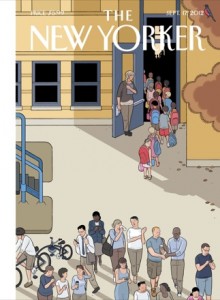September 17, 2012: “The Last Few Kilometres” by Leonard Tsypkin
I don’t recognize the name of the writer, from Minsk, who died in 1982. The contributors’ notes tell us that this story was written in 1972.
It’s behind the paywall, so let me summarize it: an elderly man (he didn’t bring his dentures) pays a visit to his mistress in Moscow. He’s now on his way home by train, and his observations of the scenery and his fellow passengers are interspersed with his recollection of the evening. It seems as if his visit was perfunctory—he was keen to get on the train to go home. He didn’t want to eat, but he had to out of politeness. She served him meat blini and in the process he dropped a chicken drumstick on the floor. They made love—the event is dealt with quickly and cursorily—and they talk, although he wants a cigarette. And then he leaves.
On the train he describes the former suburbs that have been absorbed by the city, and all the rest of the drab view outside the window.
Any suggestions for what the story means would be just a guess—does the old man represent the Soviet Union in 1972? Or is he just an old man?


“Any suggestions for what the story means would be just a guess—does the old man represent the Soviet Union in 1972? Or is he just an old man?”
My guess is that he’s just an old man; not necessarily USSR circa 1972. Actually, the description of the train ride made me recall rides like that (congestion-based start and stop) which I had.
I’m also guessing that the author is looking to portray boredom. What I found interesting was the fact that his descriptions of the train ride were equal to his descriptions of the encounter in terms of detail, emotional response, etc. Actually, perhaps they weren’t equal; the balance might be tilted toward the train ride, which was obviously on his mind even while he was with his mistress. I’d think the reader’s general expectation would be that the affair would be special and the ride home an afterthought which many authors might omit altogether, especially where, as her, nothing really out of the ordinary happens on the train. So the significance, I suppose, is the fact that this story gave so much attention to the commute . . . a roundabout way of putting the mistress into perspective viz the main character’s life.
Just a guess.